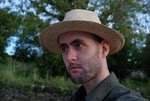
Milandra and the two boys, faster than ever before, ran through the park.
The three children, their rough hair blowing in the wind, thought only of murder as they flew by the boating lake and the man selling ice cream from a cart.
It was on the far side of the great Memorial Park – the arts quarter, where children rarely played and adults liked to wander, holding hands – where the strange alien lifeform stood.
An angular amalgam of stone, its curved tops gave the impression of heads, of life, to the artwork. Its intermingled hard, straight lines, cut and climbed across each other like people playing or fighting. And all around the grey lifelessness of the sculpture were smiling green trees, plants and lush grass.
“There,” they pointed at an imaginable 3-D area where nothing now existed; a perfect cube of emptiness that the children could all see perfectly well. “That’s where Sonya found the skull.”
The story – as it had been recounted to them a hundred times that week in school –explained that Sonya’s dad had taken his daughter out for the day, but he’d brought his girlfriend with him. Sonya, bored and tired, had slipped away while the two of them were kissing near the fountain.
She watched a squirrel run by, stop under the sculpture, dig a little, look around and then shoot off for the cover of the trees. When she skipped over to see what the squirrel had found, she saw grey-yellow bone rising from the soil.
Quite fascinated, she apparently picked it up, brushed the dirt from it and brought it over to show her dad and his girlfriend. Her dad made her take it back to where she’d found it before he called the police. His girlfriend cried. That last bit made all the children at school laugh.
Milandra now led the two boys over to the edge of the monument. Much braver than them, she leaned her hand on the sloping ‘leg’ of the sculpture and strained to see where this skull might have been buried.
“Can you see anything?” asked one of the boys; a short, scrunched up, red-headed child of 10. “M-Maybe there’s more bones, and a f-f-full sk-skeleton down there?” asked the other, then sneezed into his hand and wiped it on the grass.
But Milandra took a step forward, knelt down and shook her head. “It’s all gone,” she said softly. “This isn’t a grave anymore.”
She looked up to see that the other two boys had joined her to kneel beneath the sculpture. So Milandra, realising she was in sole charge of proceedings, did the only thing she could think of doing. She made the sign of the cross, closed her eyes, and led the boys in solemn prayer at the graveside of the unknown skeleton.
She made them both stay there, until the prayer was done, but as soon as she said “Amen” she let them both run, far from the scene. Milandra, though, walked away slowly, looking back continually, just in case she saw something there.
She kept looking behind her until she reached the duck pond.










